Shizhu He
WideSeek: Advancing Wide Research via Multi-Agent Scaling
Feb 02, 2026Abstract:Search intelligence is evolving from Deep Research to Wide Research, a paradigm essential for retrieving and synthesizing comprehensive information under complex constraints in parallel. However, progress in this field is impeded by the lack of dedicated benchmarks and optimization methodologies for search breadth. To address these challenges, we take a deep dive into Wide Research from two perspectives: Data Pipeline and Agent Optimization. First, we produce WideSeekBench, a General Broad Information Seeking (GBIS) benchmark constructed via a rigorous multi-phase data pipeline to ensure diversity across the target information volume, logical constraints, and domains. Second, we introduce WideSeek, a dynamic hierarchical multi-agent architecture that can autonomously fork parallel sub-agents based on task requirements. Furthermore, we design a unified training framework that linearizes multi-agent trajectories and optimizes the system using end-to-end RL. Experimental results demonstrate the effectiveness of WideSeek and multi-agent RL, highlighting that scaling the number of agents is a promising direction for advancing the Wide Research paradigm.
Bottom-up Policy Optimization: Your Language Model Policy Secretly Contains Internal Policies
Dec 22, 2025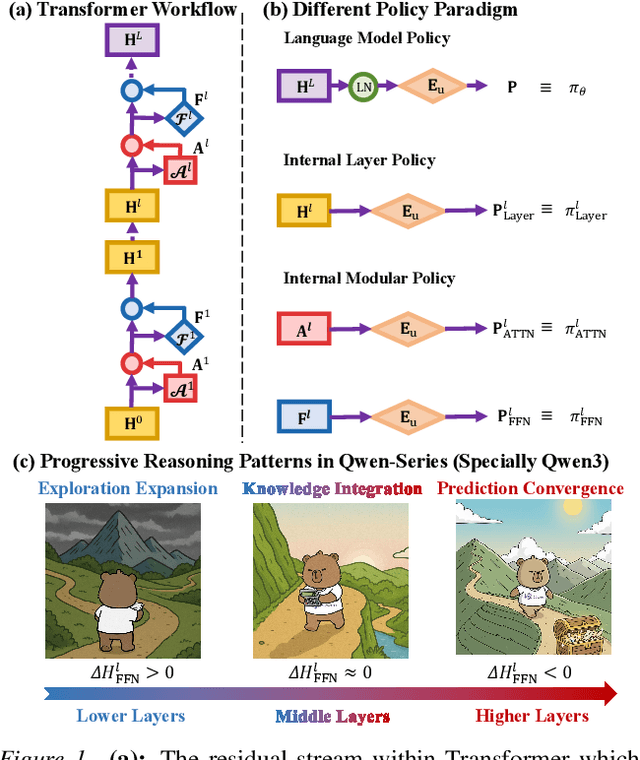
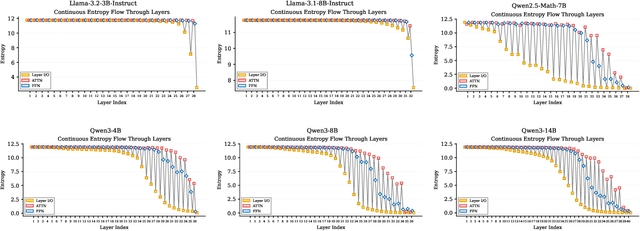
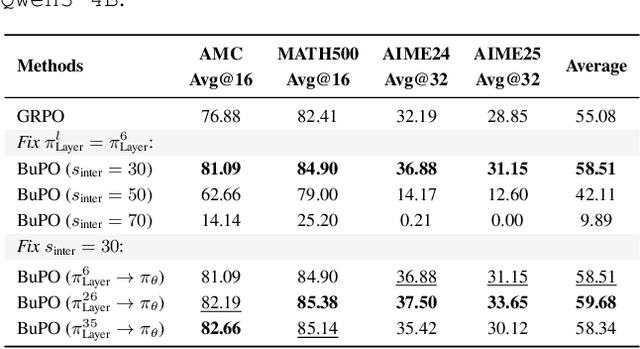
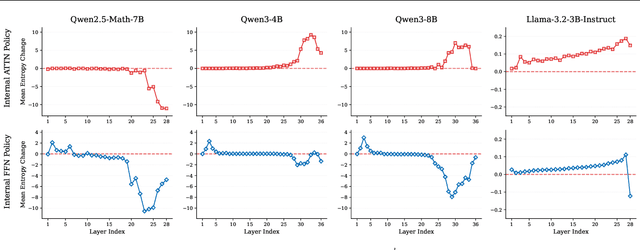
Abstract:Existing reinforcement learning (RL) approaches treat large language models (LLMs) as a single unified policy, overlooking their internal mechanisms. Understanding how policy evolves across layers and modules is therefore crucial for enabling more targeted optimization and raveling out complex reasoning mechanisms. In this paper, we decompose the language model policy by leveraging the intrinsic split of the Transformer residual stream and the equivalence between the composition of hidden states with the unembedding matrix and the resulting samplable policy. This decomposition reveals Internal Layer Policies, corresponding to contributions from individual layers, and Internal Modular Policies, which align with the self-attention and feed-forward network (FFN) components within each layer. By analyzing the entropy of internal policy, we find that: (a) Early layers keep high entropy for exploration, top layers converge to near-zero entropy for refinement, with convergence patterns varying across model series. (b) LLama's prediction space rapidly converges in the final layer, whereas Qwen-series models, especially Qwen3, exhibit a more human-like, progressively structured reasoning pattern. Motivated by these findings, we propose Bottom-up Policy Optimization (BuPO), a novel RL paradigm that directly optimizes the internal layer policy during early training. By aligning training objective at lower layer, BuPO reconstructs foundational reasoning capabilities and achieves superior performance. Extensive experiments on complex reasoning benchmarks demonstrates the effectiveness of our method. Our code is available at https://github.com/Trae1ounG/BuPO.
The Zero-Step Thinking: An Empirical Study of Mode Selection as Harder Early Exit in Reasoning Models
Oct 22, 2025Abstract:Reasoning models have demonstrated exceptional performance in tasks such as mathematics and logical reasoning, primarily due to their ability to engage in step-by-step thinking during the reasoning process. However, this often leads to overthinking, resulting in unnecessary computational overhead. To address this issue, Mode Selection aims to automatically decide between Long-CoT (Chain-of-Thought) or Short-CoT by utilizing either a Thinking or NoThinking mode. Simultaneously, Early Exit determines the optimal stopping point during the iterative reasoning process. Both methods seek to reduce the computational burden. In this paper, we first identify Mode Selection as a more challenging variant of the Early Exit problem, as they share similar objectives but differ in decision timing. While Early Exit focuses on determining the best stopping point for concise reasoning at inference time, Mode Selection must make this decision at the beginning of the reasoning process, relying on pre-defined fake thoughts without engaging in an explicit reasoning process, referred to as zero-step thinking. Through empirical studies on nine baselines, we observe that prompt-based approaches often fail due to their limited classification capabilities when provided with minimal hand-crafted information. In contrast, approaches that leverage internal information generally perform better across most scenarios but still exhibit issues with stability. Our findings indicate that existing methods relying solely on the information provided by models are insufficient for effectively addressing Mode Selection in scenarios with limited information, highlighting the ongoing challenges of this task. Our code is available at https://github.com/Trae1ounG/Zero_Step_Thinking.
Towards Agentic Self-Learning LLMs in Search Environment
Oct 16, 2025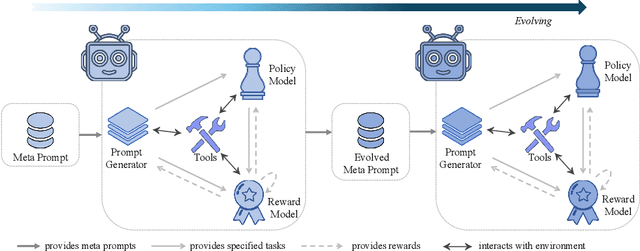
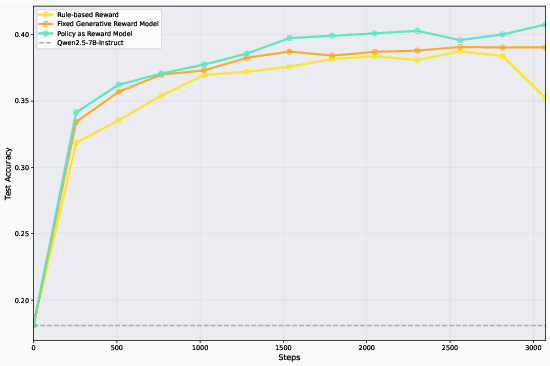
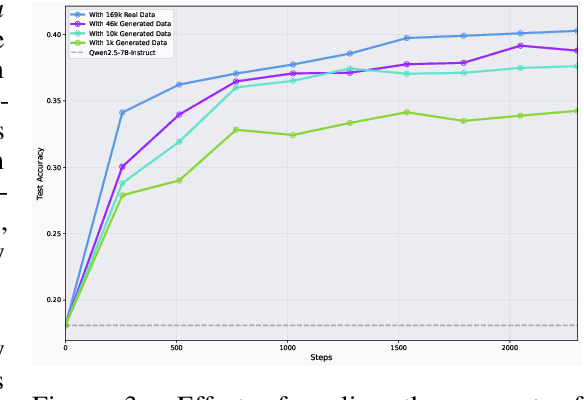
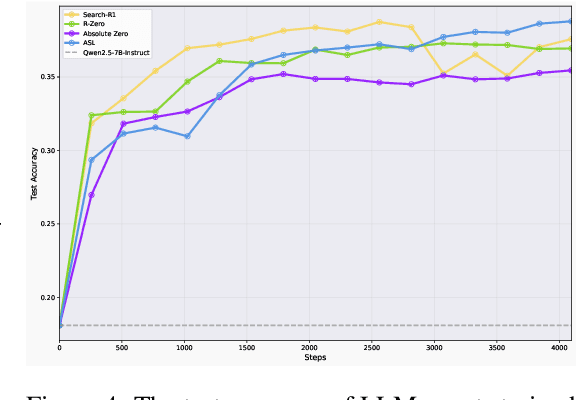
Abstract:We study whether self-learning can scale LLM-based agents without relying on human-curated datasets or predefined rule-based rewards. Through controlled experiments in a search-agent setting, we identify two key determinants of scalable agent training: the source of reward signals and the scale of agent task data. We find that rewards from a Generative Reward Model (GRM) outperform rigid rule-based signals for open-domain learning, and that co-evolving the GRM with the policy further boosts performance. Increasing the volume of agent task data-even when synthetically generated-substantially enhances agentic capabilities. Building on these insights, we propose \textbf{Agentic Self-Learning} (ASL), a fully closed-loop, multi-role reinforcement learning framework that unifies task generation, policy execution, and evaluation within a shared tool environment and LLM backbone. ASL coordinates a Prompt Generator, a Policy Model, and a Generative Reward Model to form a virtuous cycle of harder task setting, sharper verification, and stronger solving. Empirically, ASL delivers steady, round-over-round gains, surpasses strong RLVR baselines (e.g., Search-R1) that plateau or degrade, and continues improving under zero-labeled-data conditions, indicating superior sample efficiency and robustness. We further show that GRM verification capacity is the main bottleneck: if frozen, it induces reward hacking and stalls progress; continual GRM training on the evolving data distribution mitigates this, and a small late-stage injection of real verification data raises the performance ceiling. This work establishes reward source and data scale as critical levers for open-domain agent learning and demonstrates the efficacy of multi-role co-evolution for scalable, self-improving agents. The data and code of this paper are released at https://github.com/forangel2014/Towards-Agentic-Self-Learning
SparK: Query-Aware Unstructured Sparsity with Recoverable KV Cache Channel Pruning
Aug 21, 2025Abstract:Long-context inference in large language models (LLMs) is increasingly constrained by the KV cache bottleneck: memory usage grows linearly with sequence length, while attention computation scales quadratically. Existing approaches address this issue by compressing the KV cache along the temporal axis through strategies such as token eviction or merging to reduce memory and computational overhead. However, these methods often neglect fine-grained importance variations across feature dimensions (i.e., the channel axis), thereby limiting their ability to effectively balance efficiency and model accuracy. In reality, we observe that channel saliency varies dramatically across both queries and positions: certain feature channels carry near-zero information for a given query, while others spike in relevance. To address this oversight, we propose SPARK, a training-free plug-and-play method that applies unstructured sparsity by pruning KV at the channel level, while dynamically restoring the pruned entries during attention score computation. Notably, our approach is orthogonal to existing KV compression and quantization techniques, making it compatible for integration with them to achieve further acceleration. By reducing channel-level redundancy, SPARK enables processing of longer sequences within the same memory budget. For sequences of equal length, SPARK not only preserves or improves model accuracy but also reduces KV cache storage by over 30% compared to eviction-based methods. Furthermore, even with an aggressive pruning ratio of 80%, SPARK maintains performance with less degradation than 5% compared to the baseline eviction method, demonstrating its robustness and effectiveness. Our code will be available at https://github.com/Xnhyacinth/SparK.
Socratic-PRMBench: Benchmarking Process Reward Models with Systematic Reasoning Patterns
May 29, 2025Abstract:Process Reward Models (PRMs) are crucial in complex reasoning and problem-solving tasks (e.g., LLM agents with long-horizon decision-making) by verifying the correctness of each intermediate reasoning step. In real-world scenarios, LLMs may apply various reasoning patterns (e.g., decomposition) to solve a problem, potentially suffering from errors under various reasoning patterns. Therefore, PRMs are required to identify errors under various reasoning patterns during the reasoning process. However, existing benchmarks mainly focus on evaluating PRMs with stepwise correctness, ignoring a systematic evaluation of PRMs under various reasoning patterns. To mitigate this gap, we introduce Socratic-PRMBench, a new benchmark to evaluate PRMs systematically under six reasoning patterns, including Transformation, Decomposition, Regather, Deduction, Verification, and Integration. Socratic-PRMBench}comprises 2995 reasoning paths with flaws within the aforementioned six reasoning patterns. Through our experiments on both PRMs and LLMs prompted as critic models, we identify notable deficiencies in existing PRMs. These observations underscore the significant weakness of current PRMs in conducting evaluations on reasoning steps under various reasoning patterns. We hope Socratic-PRMBench can serve as a comprehensive testbed for systematic evaluation of PRMs under diverse reasoning patterns and pave the way for future development of PRMs.
Amplify Adjacent Token Differences: Enhancing Long Chain-of-Thought Reasoning with Shift-FFN
May 22, 2025Abstract:Recently, models such as OpenAI-o1 and DeepSeek-R1 have demonstrated remarkable performance on complex reasoning tasks through Long Chain-of-Thought (Long-CoT) reasoning. Although distilling this capability into student models significantly enhances their performance, this paper finds that fine-tuning LLMs with full parameters or LoRA with a low rank on long CoT data often leads to Cyclical Reasoning, where models repeatedly reiterate previous inference steps until the maximum length limit. Further analysis reveals that smaller differences in representations between adjacent tokens correlates with a higher tendency toward Cyclical Reasoning. To mitigate this issue, this paper proposes Shift Feedforward Networks (Shift-FFN), a novel approach that edits the current token's representation with the previous one before inputting it to FFN. This architecture dynamically amplifies the representation differences between adjacent tokens. Extensive experiments on multiple mathematical reasoning tasks demonstrate that LoRA combined with Shift-FFN achieves higher accuracy and a lower rate of Cyclical Reasoning across various data sizes compared to full fine-tuning and standard LoRA. Our data and code are available at https://anonymous.4open.science/r/Shift-FFN
Beyond Hard and Soft: Hybrid Context Compression for Balancing Local and Global Information Retention
May 21, 2025Abstract:Large Language Models (LLMs) encounter significant challenges in long-sequence inference due to computational inefficiency and redundant processing, driving interest in context compression techniques. Existing methods often rely on token importance to perform hard local compression or encode context into latent representations for soft global compression. However, the uneven distribution of textual content relevance and the diversity of demands for user instructions mean these approaches frequently lead to the loss of potentially valuable information. To address this, we propose $\textbf{Hy}$brid $\textbf{Co}$ntext $\textbf{Co}$mpression (HyCo$_2$) for LLMs, which integrates both global and local perspectives to guide context compression while retaining both the essential semantics and critical details for task completion. Specifically, we employ a hybrid adapter to refine global semantics with the global view, based on the observation that different adapters excel at different tasks. Then we incorporate a classification layer that assigns a retention probability to each context token based on the local view, determining whether it should be retained or discarded. To foster a balanced integration of global and local compression, we introduce auxiliary paraphrasing and completion pretraining before instruction tuning. This promotes a synergistic integration that emphasizes instruction-relevant information while preserving essential local details, ultimately balancing local and global information retention in context compression. Experiments show that our HyCo$_2$ method significantly enhances long-text reasoning while reducing token usage. It improves the performance of various LLM series by an average of 13.1\% across seven knowledge-intensive QA benchmarks. Moreover, HyCo$_2$ matches the performance of uncompressed methods while reducing token consumption by 88.8\%.
Neural Incompatibility: The Unbridgeable Gap of Cross-Scale Parametric Knowledge Transfer in Large Language Models
May 20, 2025



Abstract:Large Language Models (LLMs) offer a transparent brain with accessible parameters that encode extensive knowledge, which can be analyzed, located and transferred. Consequently, a key research challenge is to transcend traditional knowledge transfer paradigms rooted in symbolic language and achieve genuine Parametric Knowledge Transfer (PKT). Significantly, exploring effective methods for transferring knowledge across LLMs of different scales through parameters presents an intriguing and valuable research direction. In this paper, we first demonstrate $\textbf{Alignment}$ in parametric space is the fundamental prerequisite to achieve successful cross-scale PKT. We redefine the previously explored knowledge transfer as Post-Align PKT (PostPKT), which utilizes extracted parameters for LoRA initialization and requires subsequent fine-tune for alignment. Hence, to reduce cost for further fine-tuning, we introduce a novel Pre-Align PKT (PrePKT) paradigm and propose a solution called $\textbf{LaTen}$ ($\textbf{L}$oc$\textbf{a}$te-$\textbf{T}$h$\textbf{e}$n-Alig$\textbf{n}$) that aligns the parametric spaces of LLMs across scales only using several training steps without following training. Comprehensive experiments on four benchmarks demonstrate that both PostPKT and PrePKT face challenges in achieving consistently stable transfer. Through in-depth analysis, we identify $\textbf{Neural Incompatibility}$ as the ethological and parametric structural differences between LLMs of varying scales, presenting fundamental challenges to achieving effective PKT. These findings provide fresh insights into the parametric architectures of LLMs and highlight promising directions for future research on efficient PKT. Our code is available at https://github.com/Trae1ounG/Neural_Incompatibility.
Better wit than wealth: Dynamic Parametric Retrieval Augmented Generation for Test-time Knowledge Enhancement
Mar 31, 2025Abstract:Retrieval-augmented generation (RAG) enhances large language models (LLMs) by retrieving relevant documents from external sources and incorporating them into the context. While it improves reliability by providing factual texts, it significantly increases inference costs as context length grows and introduces challenging issue of RAG hallucination, primarily caused by the lack of corresponding parametric knowledge in LLMs. An efficient solution is to enhance the knowledge of LLMs at test-time. Parametric RAG (PRAG) addresses this by embedding document into LLMs parameters to perform test-time knowledge enhancement, effectively reducing inference costs through offline training. However, its high training and storage costs, along with limited generalization ability, significantly restrict its practical adoption. To address these challenges, we propose Dynamic Parametric RAG (DyPRAG), a novel framework that leverages a lightweight parameter translator model to efficiently convert documents into parametric knowledge. DyPRAG not only reduces inference, training, and storage costs but also dynamically generates parametric knowledge, seamlessly enhancing the knowledge of LLMs and resolving knowledge conflicts in a plug-and-play manner at test-time. Extensive experiments on multiple datasets demonstrate the effectiveness and generalization capabilities of DyPRAG, offering a powerful and practical RAG paradigm which enables superior knowledge fusion and mitigates RAG hallucination in real-world applications. Our code is available at https://github.com/Trae1ounG/DyPRAG.
 Add to Chrome
Add to Chrome Add to Firefox
Add to Firefox Add to Edge
Add to Edge